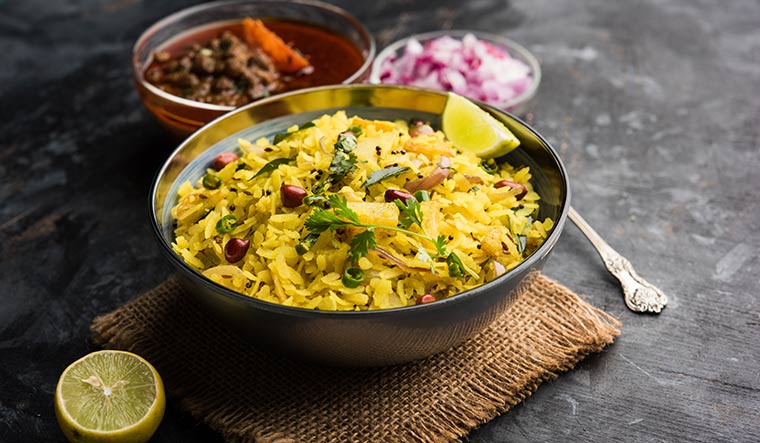You say a child wants food, not nutrients.
As parents when we offer food to children, it shouldn't be based on its composition of proteins or fats or carbs or sugar. Instead, it should be based on what is local, in season and traditional. What we are fast losing is a sense of connectedness with our food and environment. Until ten years ago, people only had dal chawal for dinner and now they are avoiding carbs. It is an obsession with all these fancy labels, which doesn't really mean that we are getting fitter as a society. In fact, we are only getting much fatter and sicker. Also, choosing food based on nutrients is only profitable for the food industry. It doesn't work for the health of people. Yet, it is so ingrained in our education system that we think it is the most scientific method of choosing food. It is rather a confusing and biased method of choosing food that makes people feel the need to connect with a dietician, professional or a doctor. So, you need to go back to basics when it comes to giving a child her daily food.
You talk about grandma's wisdom in your book, Notes for Healthy Kids.
Our grandmothers haven't got their due. When I attend international conferences where they talk about sustainable development and what human life will look like in 2050 and what AI and climate change will do to us, I realise that we need to take a multidisciplinary approach [to food]. For good health, we need to look at land, politics, gender equations in society, crop cycle, policies, schools, households, societies and cities from a more holistic point of view and see whether people are turning healthier or unhealthier.
Today, India has the second most obese children in the world. That's not because we don't care for our children, in fact we care too much. It is actually the government policies that are making [junk food] the easy choice. The United Nations has slogans such as make healthy choice the easy choice. But how do you do that? Instead of having fruits or peanuts, which is a healthy choice, outside schools, a child is exposed to chips and tetra pack juices. That's a sociopolitical problem, not just a lifestyle problem. It will take investment and commitment from the government.... There are ecological connections, too. Everything is related to health.
Our grandmas had pickled stuff, ate food that was in season, chose food that was climate resilient, and ate in a way where they were conscious of their consumption. So, we need to go back to traditional wisdom in the way we eat. All this wisdom is available in indigenous languages. Because we think English is the language of science, we lose on more and more of this traditional wisdom.
How can one handle fussy children?
It is a multifold problem. What works well is getting the child connected to the soil. If you grow, for example, coriander in the window, the child knows how the process works. Take them to the farm at least once every month. Let them observe plants, trees, fruits, berries in their natural settings so as to make them conscious about food. Because when they know where it is coming from, they buy into it. Connecting with food requires connecting with the environment. Also, parents must cook more at home. When children see their parents in the kitchen, they, too, will follow and will fall in love with the process of cooking and eating. Also, the entire family must eat at a fixed time everyday with no phone activity or TV at all.
There was a five-year study that was done in the European Union on children's health (the I.Family Study), and they found that a child doesn't get unhealthy in isolation. It is a part of the entire environment that contributes to it. They noticed that saying no to the child helps them.... The point is that as a parent you have to overcome your child's pester power. You must persist. But we also want the government to respond to this problem, which was also what the I.Family Study noted. The government must ensure that there is no junk food advertisement on TV. As parents, we must lobby for it and vote for the government on the lines of health.
What led you to write the book?
It was to educate and inform parents. We can't shame a child into eating right. We can educate them to eat right and then the change invariably comes.
What should be the food pattern of a low birth weight child?
Low birth weight of a child is also a part of nutrition transition, which I have written about in the book. Nutrition transition is not good. It means ending diversity for uniformity in food. Earlier, we had a Malayali eating differently than a Punjabi, who, in turn, ate differently than a Bengali. But now, we are all eating westernised food or packaged and processed food. And, we move much lesser than our parents used to. Children are not low birth weight in isolation—it is mostly the result of a mother who has become very fat during pregnancy. A mother's obesity is also not a personal problem, but a policy issue. For instance, when mothers are asked to not travel by local transport during pregnancy, it leaves them with no choice but to remain at home, which, in turn, adds to their weight.
But what we can do to tackle low birth weight kids is to give them desi cow's milk and ghee in proportion to the meals. But don't do anything extra to fatten them. Please do not subscribe to any protein powders or supplements. Because in the process of fattening them up, we are also feeding them fears that something is wrong with them. And, these fattening tonics that we give toddlers change them so much that they get PCOD and other problems on growing up. Instead, feed them ragi kheer and sooji halwa, which is very homely and healthy.
Having said that, I want to reiterate that a child's weight is no one's business. And, mothers must stop feeling guilty or pressured about it. If the child is energetic, active and happy, it is just fine. Raising a child is a collective commitment. It takes a village to raise a child, not the mother alone. So, she shouldn't be facing the judgment alone. If something is wrong with my child, it is also your fault.
Given the nuclear family setup we live in, how can parents bring up their children in the best way?
Cooking isn't the chore that it is made out to be. It is actually time-saving than time-consuming. It also keeps everyone in the family healthy, [and helps] save on the money you spend on tonics and medicines. It is a critical investment. The game changer for a nuclear family is getting the Indian male to start working at home. We don't need reservations in Parliament, rather we need men's reservation in the kitchen. Earlier, men would work in the kitchen, but this new breed doesn't seem to think the same way, which is shameful. We are geared in a way where the woman is just killing herself to service everyone at home.
To what extent can parents allow the child to consume junk food?
There are many decent vendors who sell on the roadside. Eat there once every two weeks and eat one or two dishes at one time. Don't think you can have chaat for dinner. Also, the point is to not make junk food aspirational for children. Parents must not bribe them as return gifts or treats.
What should a child eat daily without fail? Also, how can one limit chocolates?
Rice, peanuts, ghee, a seasonal fruit, a homemade laddu—these must be given every day, and other food that is locally available. Chocolates must be limited and children should be made aware that it is the chocolate industry that still involves child labour in a big way. Don't give them chocolates as a treat. It should be limited to once a week.
Five snacks for children
❍ Handful of peanuts
❍ Fresh fruit
❍ Poha
❍ Roti, jaggery and ghee
❍ Homemade snacks like chiwda and matthi



